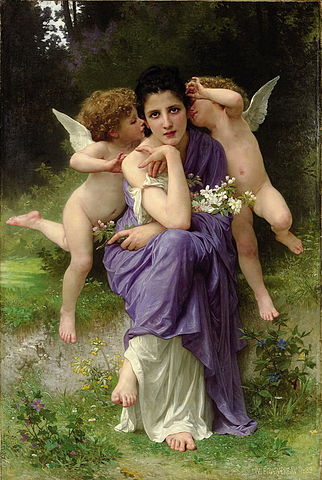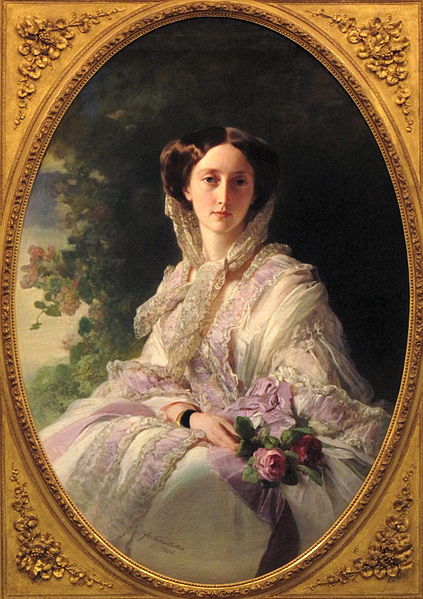 |
| illus. by Arthur Hughes, 1905. via Art of Narrative blog |
"My mind was just reviving a little from it's extreme terror, when, suddenly, a flash of lightning, or rather a cataract of successive flashes, behind me, seemed to throw on the ground in front of me, but far more faintly than before, from the extent of the source of the light, the shadow of the same horrible hand. I sprang forward, stung to yet wilder speed, but had not run many steps before my foot slipped, and, vainly attempting to recover myself, I fell at the foot of one of the large trees. Half-stunned, I yet raised myself, and almost involuntarily looked back. All I saw was the hand within three feet of my face. But, at the same moment, I felt two large soft arms thrown around me from behind; and a voice like a woman's said:
'Do not fear the goblin; he dares not hurt you now.'
With that, the hand was suddenly withdrawn as from a fire, and disappeared in the darkness and the rain. Overcome with the mingling of terror and joy, I lay for some time almost insensible. The first thing I remember is the sound of a voice above me, full and low, and strangely reminding me of the sound of a gentle wind amidst the leaves of a great tree. ..."
 |
| illus. by John Bell, 1894. via glowwormandstar.tumblr.com |
"... I know nothing more that passed till I found myself lying under a superb beech-tree, in the clear light of the morning, just before sunrise. ...I rose, and put my arms as far as they would reach around the beech-tree, and kissed it, and said goodbye. A trembling went through the leaves; a few of the last drops of the night's rain fell from off them at my feet; and as I walked slowly away, I seemed to hear in a whisper once more the words, : 'I may love him, I may love him; for he is a man, and I am only a beech-tree.' "
-George Macdonald, excerpt from Phantastes
-Welcome to the world of Phantastes. Delightful. Deceptive. Dangerous. Everything you knew about Faerie... and maybe some things you don't. This journey into the realm of Faerie is also one thing many are not-deeply, intensely moral. As Madeleine L'Engle put it, "Surely, George Macdonald is the grandfather of us all-all who struggle to come to terms with truth through fantasy."
This is one of my all-time, deeply personal favorites. At the end of the book, Anados (our hero and first-person narrator) returns to the world of men from the world of Faerie, but not without having been changed by the lessons he has gained in Faerie, with the fear that if he forgets, he will follow the same course again in the world of men, living twice his mistakes and follies, and ultimately, regrets.
He ponders the chances that his adventures in Faerieland might have been merely dreams; but then, he sometimes hears whispers from the other side; the song of the beech tree still whispers to him in dreams.
For my part, I remember the song of the beech when I hear the rain through the leaves of the trees in summer, and often in personal moments of love, I repeat them to myself as a sort of benediction.
But the beech-tree and her connection with Anodos, however appealing to my poetic and mythopoeic senses, is not what makes Phantastes ultimately so meaningful to me. The deepest lesson I gleaned from Macdonald in this romance is the clearest view of Humility I have ever gained.
I have had recurring thoughts on doing an introspective post like this for a while. It is my belief that writers, especially young and early writers (but by no means exclusively young writers) have a nearly universal propensity to arrogance... well, I suppose the observation applies to artists in general, but it is more vivid in writers because one hears the arrogance in their creative voices, while with visual and other nonverbal arts it is less distinguishable.
Now I am the first to be annoyed by "that tone" in another writer; but my husband is the first to notice it in my writing, to which I am often blind. You see, it is a Shadow: you try to look at it squarely and you can't catch hold of it. It's a peripheral edge; a tone, an aura. But that arrogance is the single difference between those authors that are merely good writers and those who have changed my life and the way I see the world in some intrinsic way. Almost universally, I can point to my favorite authors, and what I enjoy most about their writings is their frankness and personal understanding of the frailties of humanity. They deal with their own dignity with humor; they do not take themselves too seriously- they deal with the failings of others like a comrade-at-arms.
By contrast, those of us who seek to write or create at a younger age or stage often fall into our arrogance unintentionally... it is natural, if you use the unique view and voice you call your own to produce any work of art, your tendency will be to heed that voice and ignore the hum of critique. One grows used to being the door-opener, the light-revealer, the perspective-giver: the prophetic "voice of one crying in the wilderness." But this strength of seeing the world differently, of walking to the beat of a different drum, becomes a weakness on the other side of Janus.
I had to do several exercises just to see it in myself... and now though I have caught the Shadow in my sights, it still gives me trouble. One exercise is to evaluate one's writing for eloquence- am I most poetic when describing myself? How much in turn do I describe my faults eloquently and candidly? Am I always portraying myself as this wonderful visionary person on the inside? And how much do I worship and adore my own works? (They also count when analyzing verbosity concerning the self.) What evidence does my work give about my passion? Is it really about itself, or is it about me and my glory?
Another: how many of my avid followers and readers and so forth are "younger" than myself? Put another way, do I surround myself with acolytes, with unmixed praise-givers? Do true and honest critics feel welcome in my little world? If they are not, it will indeed be a very little world. My best critic is my husband... he sees the world differently, so we have vastly varying views. I used to be very wounded when he did not value a poem I had written, or even necessarily understand it. But having someone with an opposite mental pole is truly important to the writing process.
The most difficult exercise I set myself (yes, I am using myself, but trying to do it introspectively, not handing down the laws of God, as it were, but offering personal observation from within) came after a successful writing professor in college first mentioned in a class that the weakness of young poets is self-absorption. He told us, "If you want to sound like mature writers, avoid the vertical pronoun." (That took me a while, a fellow classmate informed me that he meant 'I'). So I took the challenge, to find how difficult it might be. I set myself to write a series of poems on other people with absolutely no references to myself. This was so challenging that I realized how little I try to write through the eyes of others than myself... how can I hope to reach people, to impact their lives, if I do not understand them?
 |
| There They Are, illus. by John Bell, 1894. via Art of Narrative. |
In Phantastes, George Macdonald draws a stunning picture of humility. It was the most beautiful, freeing picture I have ever seen. Humility is not pretending that you don't know you are a good writer when you are. But it shouldn't matter. It shouldn't require repetition. No great author had to particularly sit singing his own praises (well, I suppose there was Thoreau!). We are called to a greater glory and purpose than our own... we sense this, but we turn around and pride ourselves on sensing it, thus going right back to the beginning, seeking our own vanity.
We laugh when we read Jane Austen's comic interpretations of people's foibles; the middle-aged baronet whose excessive personal vanity leads him to have full-length mirrors everywhere and wish not to be seen with any man whose hair is not "done" properly; the petty vicar's wife covered head to toe in ribbons and lace, who declares she has "a horror of being over-trimmed." We laugh; but is our personal artistic vanity on another level, or would someone with Austen's wit and talent find the humor at the heart of it? How often a blogger makes the claim "I hope I do not take myself too seriously!" But I've met very few who don't, starting at myself.
I believe this post is all the more worthwhile because online I have encountered a world of entrepreneurial writers in the form of bloggers, bypassing the traditional publishing route by self-publishing on blogs, through Amazon, and in other venues. And for a long while, (as I am demanding in the capacity of critic), I encountered nothing special. But I have over time run into a small number of bloggers who truly write well-some admittedly better than myself, even in my own genres. And I believe the capacity for great writing is not dead... but the impediment which artistic arrogance creates is stunting our growth, and by avoiding the editorial process of common publishing, we have less reason than ever before to face and overcome that Shadow.
These are as much questions for me personally to revisit as any reader; and I will close with a final quote from the end of Phantastes; what is for me the pith of the whole thing:
 |
illus. by John Bell, 1894. via awesomestories.com
|
 |
| illus. John Bell, 1984. |
"My mind soon grew calm; and I began the duties of my new position, somewhat instructed, I hoped, by the adventures that had befallen me in Fairy Land. Could I translate the experience of my travels there, into common life? This was the question. Or must I live it all over again, in the other forms that belong to the world of men, whose experience yet runs parallel to that of Fairy Land. These questions I cannot answer yet. But I fear. ...
May the world be brighter for me, at least in those portions of it, where my darkness falls not.
Thus I, who set out to find my Ideal, came back rejoicing that I had lost my Shadow."
I hope all of us who set out to find an ideal of beauty and wonder in art, eventually come to a similar epiphany.



























